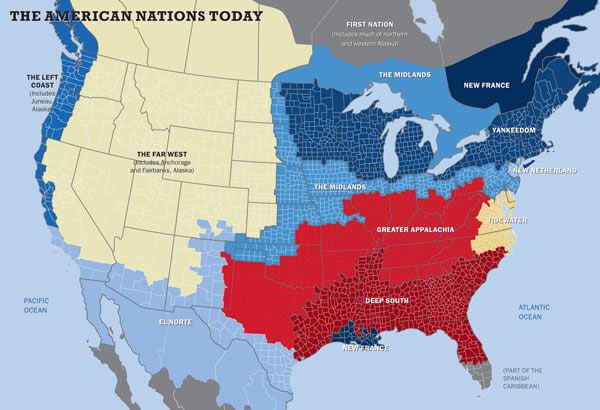Book Rec: American Nations
The regional history lesson in American Nations will help you better understand the perspectives of fellow U.S. citizens.
Have you ever stopped and wondered why things are the way they are? In America, I mean. I totally have!
I grew up in rural southeast Wisconsin. We drink beer and eat cheese and sausage—the Holy Trinity, I call it. Many generations shaped our culture; predominantly, German and Norwegian immigrants settled the area. In case future generations forgot that, they named the towns after where they came from—my neighboring town is literally “Norway.” Passing by numerous Lutheran churches is common because it’s practiced most in Nordic countries.
But once we travel outside the spaces we’re used to, we’re exposed to a different culture and history. I wanted to know what influenced other regions, and why they think what they think. I read the book, American Nations, by Colin Woodard, and it all makes sense now. I reference this book all the time! If you follow American history or politics, this book is a must-read.
The book might seem daunting at first due to its thickness and nonfiction genre, but I cruised through it. Even if you typically find history to be boring, getting a briefing of other regions will expand your understanding of our country. Woodard does a good job of describing the history and why its relevant today. His writing style is straightforward and doesn’t try to intimidate you. American Nations will connect regional histories that your classes never had time to explore.
Woodard breaks down the history and personalities of eleven regional cultures in North America: First Nation, Yankeedom, New Netherland, Tidewater, Greater Appalacia, Midlands, Deep South, New France, Far West, El Norte, and Left Coast.

We’re taught early on in history class that America was founded by thirteen English colonies who rebelled against a tyrannical king who governed from across the ocean. This is true. However, those thirteen colonies were not unified in beliefs, just a common enemy. Ever since its independence, we’ve been a country of rival nations, vying for influence over the country as a whole.
Southeast Wisconsin’s Identity
After reading American Nations, rural southeast Wisconsin seems most like a Midlands nation with a hint of Greater-Appalacia. It’s pluralistic and emphasizes the Middle Class, but doesn’t care for bigger government involvement. It wants to be left alone and do its own thing but gets dragged into the Yankeedom-Deep South rivalry, which is a constant thread within the book. It often begrudgingly sides with Yankeedom—but the high-morality philosophy and coastal bias of Yankeedom is annoyingly tiresome.
While American Nations is heavily researched, there is one thing I’m not sure about. I can’t tell if the book has an anti-Deep South bias or if I just oppose everything they stand for. The author comes from the Yankee state of Maine; however, I never felt like he went out of his way to paint the Deep South negatively—their actions speak for themselves. It’s something to consider, though.
We read books to broaden our perspectives. I encourage you to read American Nations to better understand other cultures within our country. Trust me, everything will make more sense!
You can buy American Nations here.